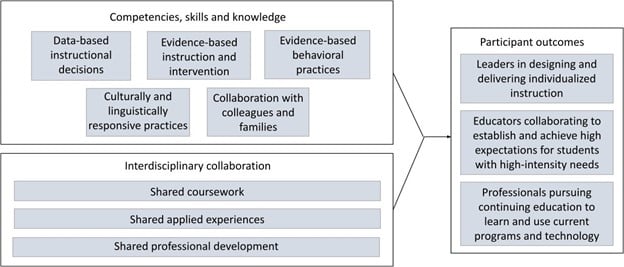About
 Project PASS-IT (Promoting Academic Success of Students with high-intensity needs through Interdisciplinary Training) is a 5-year, $1.2 million grant funded by the U.S. Department of Education Office of Special Education Programs (OSEP). The Project is led by Principal Investigator, Dr. Dana Wagner (Special Education) along with Co-Principal Investigators Dr. Shawna Petersen-Brown (School Psychology) and Dr. Alexandra Hilt-Panahon (Special Education).
Project PASS-IT (Promoting Academic Success of Students with high-intensity needs through Interdisciplinary Training) is a 5-year, $1.2 million grant funded by the U.S. Department of Education Office of Special Education Programs (OSEP). The Project is led by Principal Investigator, Dr. Dana Wagner (Special Education) along with Co-Principal Investigators Dr. Shawna Petersen-Brown (School Psychology) and Dr. Alexandra Hilt-Panahon (Special Education).
Email the Project PASS-IT team
Project PASS-IT will provide interdisciplinary training to future special education teachers and school psychologists. Specifically, they will be prepared to lead collaborative efforts to utilize current evidence-based practices that maximize the academic achievement of students who have high-intensity needs, including students with Specific Learning Disabilities (SLD). Collaboration between these professions has been shown in the research to improve outcomes for students with high-intensity needs. The grant will provide students in both the special education master’s and school psychology doctoral programs the opportunity to work together in coursework and field-based experiences, an opportunity that would not otherwise be available for students. During the 5-year grant period, Project PASS-IT will provide funding for 36 graduate students enrolled in special education and school psychology programs.
Benefits:
- Project PASS-IT scholars receive funding meant to cover 15 credits of tuition and corresponding fees each year, in addition to a stipend for books and supplies
- Scholars participate in interdisciplinary training. Scholars participate in coursework in both special education and school psychology, taught by faculty from both programs. This results in more well rounded knowledge and skills. Scholars also participate in collaborative problem-solving experiences to develop skills in leadership, consultation, and collaboration.
Core competencies:
Project PASS-IT scholars will develop skills in the following areas:
- Data-based decision making
- Evidence-based academic practices
- Evidence-based social behavior practices
- Culturally and linguistically responsive supports
- Consultation and collaboration
Conceptual framework:

(Graphical representation of the information on this page)
Competencies, Skills and Knowledge:
- Data-based instructional decisions
- Evidence-based instruction and intervention
- Evidence-based behavioral practices
- Culturally and linguistically responsive practices
- Collaboration with colleagues and families
Interdisciplinary collaboration:
- Shared coursework
- Shared applied experiences
- Shared professional development
Patient Outcomes:
- Leaders in designing and delivering individualized instruction
- Educators collaborating to establish and achieve high expectations for student with high-intensity needs
- Professional pursuing continuing education to learn and use current programs and technology

